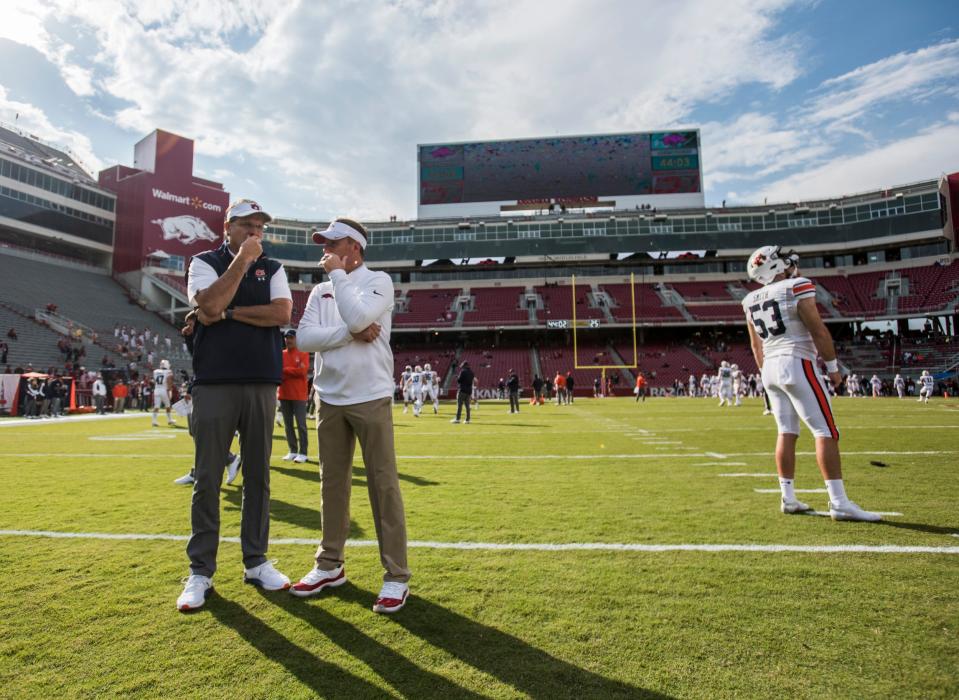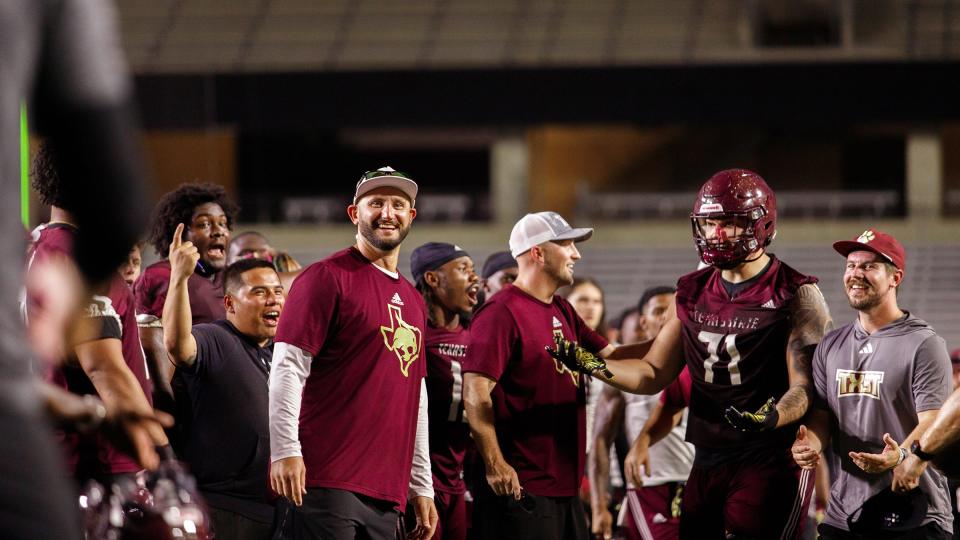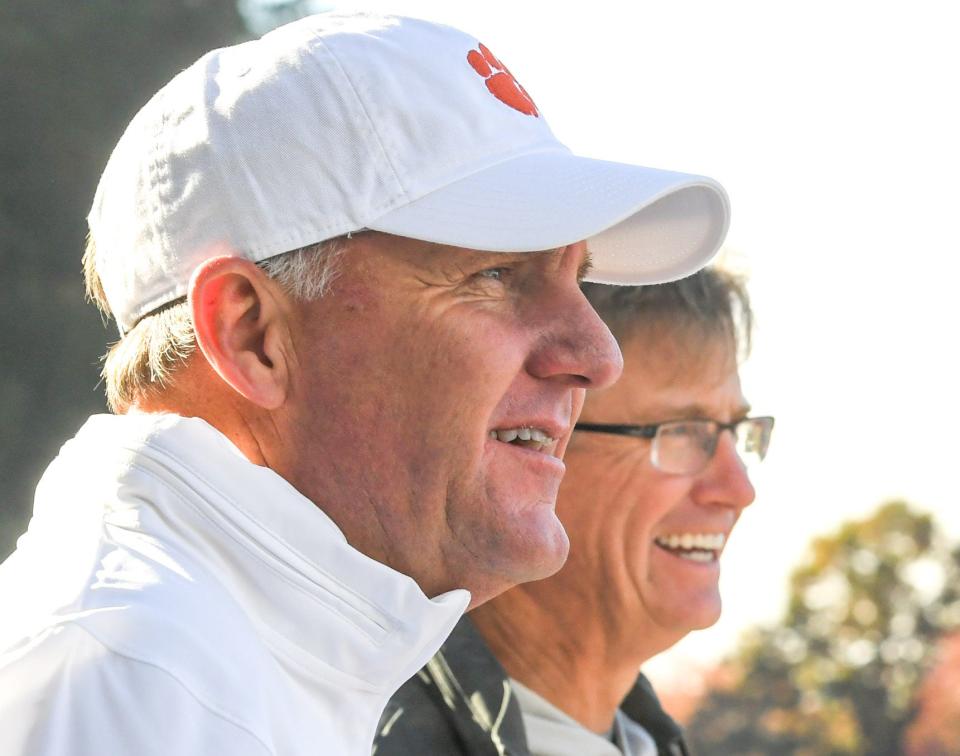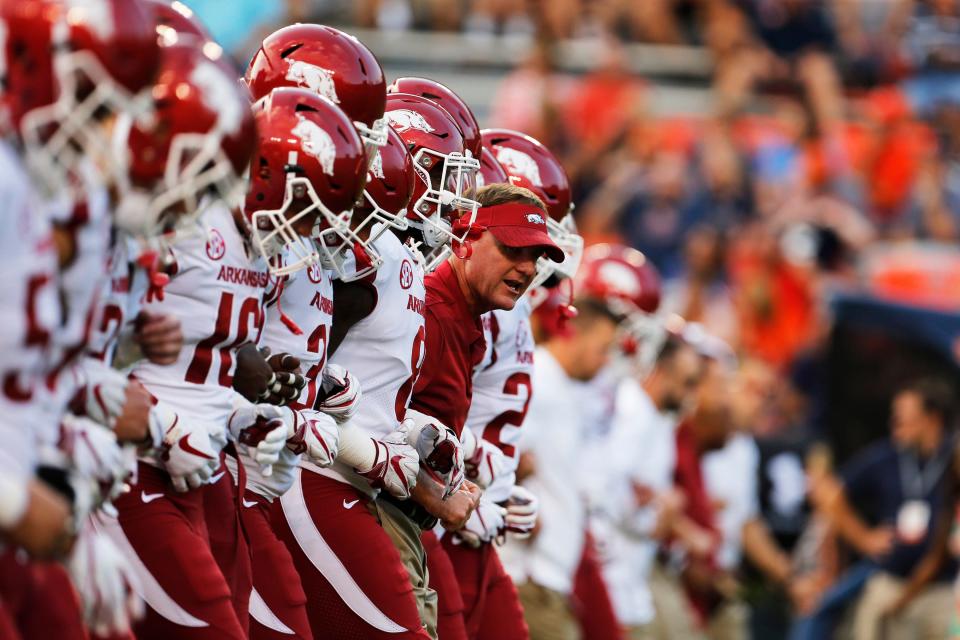Chad Morris is fired up about his latest stop: running Texas State's passing game | Bohls

SAN MARCOS — Chad Morris settled in inside his small cubicle in the south end zone football facility of Bobcat Stadium. The walls were all but barren, devoid of any family photos or mementos from a distinguished 27-year football coaching career.
A single, commemorative football from Clemson’s 31-23 win over Notre Dame last November, complete with signatures of that momentous victory in an uneven season, sat lonely atop a filing cabinet.
The names of dozens of Texas State football players were scribbled on the whiteboard next to a largely spotless desk. They are names Morris is still trying to quickly learn before spring training begins on March 21. That’s just one of many tasks that Morris, 55, is learning on the fly as he launches the next and less visible chapter of his largely successful coaching career, save a couple of outlier seasons in Fayetteville.
Chad Morris, you see, has pretty much come full circle.
He’s gone from football assistant to legendary Texas high school coach to rising head coach at SMU to a bewildering and bad, abbreviated two-year run at Arkansas to his new gig as an assistant coach. Quite the ride.
More: SEC, Big Ten pushing greed to a new level for college football playoffs | Bohls
As of January, he became the wide receivers coach and passing game offensive coordinator under Texas State head coach G.J. Kinne, a young man he used to coach at Tulsa when Morris was in charge of the Golden Hurricane quarterbacks.
“He’s just a really good coach,” said Kinne, 35, who's embarking on his second year in San Marcos. “I had my best year ever in 2010 for Chad Morris. And he gave me my first job as a GA and analyst for him. He’s a Texas legend.”

And a terrific mentor for Morris, who sees greatness in the young Kinne, the third-youngest FBS head coach. It was no accident that Kinne took the Bobcats to an FBS-record eight wins and the school’s first ever bowl win, but he’s wanting everyone in the building to think in terms of a Sun Belt championship.
“That’s the goal for us,” Kinne said.
And he thinks the hire of Morris will help Texas State get there. Morris won’t call plays, but will likely be on the sidelines rather than in the press box on Saturdays and will provide big input for the weekly game plan.
“G.J.’s extremely competitive and has a great mind for football,” Morris said in a recent two-hour visit. “He’s got a burning desire to be the best. Hey, he’s a coach’s kid.”
Morris wasn’t.

Finding his calling on the field, not fighting fires
His dad, J.B. Morris, was a fireman with the Richardson Fire Department for 32 years, a profession Chad once so strongly considered he took his fire department exams before ultimately sticking with football when his players begged him to stay.
If you don’t know Morris, he’s a super intelligent fellow who once majored in math at Texas A&M and briefly also thought about careers in the FBI and DEA. Playing college football was beyond his grasp.
He was a solid high school quarterback as a four-year starter in Edgewood, but set no passing records in the program’s power-I offense that was a far cry from the wide-open, Air Raid-like offense he’s been famous for. Never played a down of college football. In fact, he was so good at numbers, he figured he’d become an actuary.
“But that led me to thinking if I could really sit behind a desk all day long,” he said.
So he tried his hand at different numbers like first downs and passing yards instead and remained in coaching. And, well, you might say his career caught fire.
More: On Second Thought: Did Texas WR Xavier Worthy just sprint into the first round?
Starting his path in the high school ranks
He was an assistant at Eustace High School in northeast Texas where he coached quarterbacks and was an assistant on the baseball and track staffs as well. At one point, Morris was on the brink of accepting a job with the Irving Fire Department when a group of his football players showed up unannounced at his home and begged him to stay.
“They asked me, ‘Why are going to leave us?’" Morris recalled. “They were kind of tugging on my heartstrings.”
They tugged well enough to keep the 23-year-old assistant on a path that would eventually lead him to three state championships at Lake Travis and Bay City, three other state finals appearances and a glorious run as Dabo Swinney’s offensive coordinator at Clemson. That stint lay a foundation for him that led him to take his first college head coaching job and totally elevate SMU, a program that successor Sonny Dykes advanced even further.
Without the strides those two coaches and Rhett Lashlee made for the Mustangs — six winning seasons in nine years — SMU probably wouldn’t have become a member of the Power Four ACC, albeit without full revenue privileges for nine years.
More: Golden: Quandre Diggs' release illustrates fraudulent NFL salary structure
From there, he took the Arkansas job. He didn’t last. Like Bret Bielema before him and Sam Pittman after him, Morris couldn’t get the Razorbacks turned around. In the last dozen years, Arkansas had had losing records seven times and won more than seven games only twice. But Morris was let go before he was even given two full years.
“Yep, fired me after 22 months,” he said without a tinge of bitterness or regret.
He’d been an easy choice for the Razorbacks because he checked a ton of boxes. All of them, really. He’d improved each of his three years at SMU, going from two to five to seven wins, and took the Mustangs to their first bowl game in five years. He had rich contacts in the Texas high school coaching network from his days when he made a remarkable 32-0 run with former Longhorns quarterback Garrett Gilbert at Lake Travis: two perfect seasons and a pair of state titles. He was seen as being able to help Arkansas with its former recruiting base in the Lone Star State before it bolted the Southwest Conference for the SEC.
Morris did exactly that, luring the best recruiting class in the school’s history with players like quarterback K.J. Jefferson, safety Jaylon Catalon and wideout Treylon Burks.
Problem was, Morris didn’t win. Not even a little bit.
In SEC games, he won zero of them. A big, fat 0-14.
More: Is Jalin Flores Texas baseball's next great defensive shortstop? So far, so good
In fact, he won only four of 22 games overall and was let go before two full seasons by relatively new athletic director Hunter Yurachek, who incidentally took that position the same week Morris took his. Clearly Morris unfairly got precious little time to fix a program that was and still is a shadow of the football powerhouse that Arkansas was under Frank Broyles.
And just like that, he was done as a head coach. That was way back in November 2019.
“It was hard,” Morris recalled. “It was tough. Really tough. But I’m grateful. No bitterness.”

The Fayetteville stumble: two years, no regrets
Did he doubt his abilities after flaming out so quickly? Was he just not SEC-ready after three short years at SMU? Did he hire a staff that wasn’t experienced enough? Did he hire one-time, highly respected defensive coordinator John Chavis after A&M’s Jimbo Fisher didn’t retain him because he was on the downhill side of his career?
Morris, who had interviewed for head coaching jobs at Tennessee, Ole Miss and Mississippi State before accepting the Arkansas position, chooses not to belabor the reasons it didn’t work, but obviously would have loved more time. A 4-18 record is disastrous, and Paul Finebaum called him “one of the worst hires in SEC history.”
But hey, Nick Saban wasn’t Nick Saban out of the gate. He went 12-11-1 in his first two seasons at Michigan State. In his first two years at Alabama, he was a relatively pedestrian 19-8. But 0-14 stamped Morris as a bust, fair or not.
“Everywhere we’d been for 27 years, we’d been successful at every stop,” Morris said. “We were going to win. There was no doubt we had the blueprint, and we were on track. We were recruiting at a high level and I knew we would get it flipped around. I wish we had gotten another year, but we didn’t. Arkansas’s a beautiful place, a great university with a great fan base. I take responsibility. Have no ill will.”
It didn’t help that Morris couldn’t find a reliable quarterback. Heck, he started five of them in one season. And he lost to Group of Five opponents like San Jose State, North Texas and Western Kentucky, who beat the Hogs with one of Morris’s old Arkansas quarterback.
He didn’t win a game against a Power Five team. That doomed him as much as anything, but some think he didn’t help himself either.
Chad’s wife, Paula, and two children never moved with him to Fayetteville, which raised eyebrows and questions about commitment. They remained in Texas where son Chandler was the star quarterback for state champion Highland Park.
Even worse — to some’s thinking — Morris regularly left his team on Fridays to take in his son’s games back in Texas. That isn’t exactly proper protocol for most college head coaches. And people “tried to make a big deal about it,” but he insists all the preparation for Saturdays had been done and he never missed a practice.
So one of his best qualities evolved into one of the biggest criticisms. Morris has always been a guy who tries hard to balance life with equal devotion to family and football. But some in the Razorbacks community saw an absentee head coach and not a well-balanced, caring father and husband.
That probably had little to do with his undoing, but still a small contributing factor to Yurachek’s decision not to support Morris longer. For his part, Morris said he can live with his own decisions and is fully content with his choices.
More: With one game left, three things we saw in Texas basketball's stumble at No. 15 Baylor
Settling in at Texas State, ready to take flight
On many levels, Morris is another version of his mentor, Swinney, who rigidly holds fast to his Christian faith and his principles on and off the field. Morris said he has no regrets.
As for Chandler, he once committed to Arkansas before his dad was fired. He signed with Oklahoma and eventually transferred to TCU, where he’d beaten out Max Duggan before a knee injury in Chandler’s first start with the Frogs. And after six starts last year, a second knee injury cost him half a season. He’s due to graduate from TCU in May before he switches to North Texas. Or will he?
"Right now I'm going to North Texas to play," Chandler Morris said Friday. "I'm considering (Texas State) but I've got to get down and see it."
Texas State was faced with a huge quarterback quandary. T.J. Finley, last year’s starter, transferred again, this time to Western Kentucky. Kinne brought in Jayden de Laura from Arizona, but a campus uproar over a a sexual assault during his high school days in Honolulu that ended in a civil settlement caused him to depart as well.
Kinne did land transfer Jordan McCloud from James Madison and he signed two high school quarterbacks, but maybe Chandler would consider coming here to play for his dad.
“I can’t comment on that,” Chad said. “I do know G.J. loves Chandler to death.”
Heck, Chandler as a kid used to wear Kinne’s No. 4 jersey when he starred at Tulsa.
Would he consider coaching?
"No, I want no part of that," Chandler said. "It's a brutal business, and I got to see it from the front row. I'm glad my dad's doing it. It's kind of his calling. He's impacting lives. I just think he wasn't given enough time at Arkansas. He kind of only had one recruiting class, and it was the best Arkansas had ever signed. But you don't get three years to turn around a program now."
It would seem to be a perfect a reunion for Texas State and the elder Morris, who's looking to jumpstart his career after spending a year as a special assistant at Clemson. With Swinney, he basically served as an advance scout, preparing what he calls “a one-sheeter” for both the Tigers' offensive and defensive coordinators for their upcoming opponent.
“Dabo said, ‘I’m paying the guy granola bars and fruit snacks,” Morris said with a chuckle, given his pricey $10 million settlement from Arkansas that was offset by other jobs since. “I can be cheap labor.”
He probably would have stayed a second season at Clemson but for the call that came from Kinne. The one-time Longhorns quarterback was groomed by Morris at Tulsa and was hired as a GA and analyst by him at SMU and Arkansas and immediately thought of Morris when he had a staff opening for a receivers coach.
“Yeah, Dabo used to coach receivers before he became the Clemson head coach, and he told me, ‘I hope you paid attention to me,’“ Morris said. “That’s right up Dabo’s alley."
While Morris won’t call plays for the Bobcats, he’ll do everything in his power to assist his former mentee. So will David Bailiff, the Bobcats' former head coach who took them to the Division I-AA semifinals and also has rejoined Kinne’s staff to help with community relations and fundraising.
“Yeah, I call myself America’s oldest GA,” the 65-year-old Bailiff said. “I think we’re lucky to have Chad here. We’re going to put some old wisdom on the staff. Heck, I offered him a job once when he was at Lake Travis for $75,000, but lost him to (Tulsa’s) Todd Graham, who offered him $125,000.”
It ain’t about the money now.
Morris could easily live off his earnings and retire with his wife to the 200-acre Gridiron Ranch in East Texas where he suffered a horrific horse-riding accident a year ago. He had to have rods and screws inserted into his fractured left tibia, but has recovered nicely.
“I hope G.J. can use me and David,” Morris said. “That (head coaching) seat can be a lonely seat. You sometimes have to walk through fire, especially when times get tough.”
Morris knows about tough times. But also about great moments. The memories still stir within him, which is why he spent a year with Gus Malzahn at Auburn before the staff got fired and another year at USF with Jeff Scott before he, too, got fired. He briefly considered going back to the high school ranks as he did for a year at Allen before returning to Clemson.
But rejuvenating his career with his one-time protege was too hard to resist.
And does Morris still have another head coaching stop in mind?
“If it happens, it happens. Great,” he said. “And if it doesn’t … that’s great, too.”
Of course, he could always join a fire department.
This article originally appeared on Austin American-Statesman: Texas State assistant coach Chad Morris is eager to help the Bobcats
